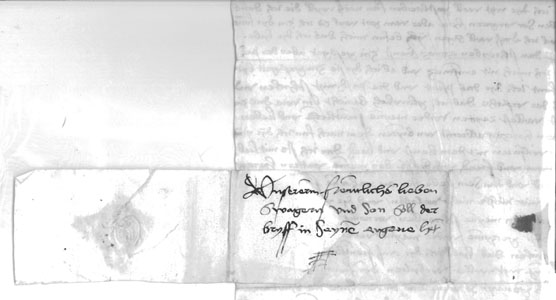Letter Written By John, Elector of Saxony (MSS 113)
John (1468-1532), called the Steadfast, elector of Saxony, fourth son of the elector Ernest, was born on the 30th June 1468. In 1486, when his eldest brother became elector as Frederick III., John received a part of the paternal inheritance and afterwards assisted his kinsman, the German king Maximilian I, in several campaigns. He was an early adherent of Luther, and becoming elector of Saxony by his brother's death in May 1525, was soon prominent among the Reformers. Having assisted to suppress the rising led by Thomas Munzer in 1525, he helped Philip, landgrave of Hesse, to found the league of Gotha, formed in 1526 for the protection of the Reformers. He was active at the diet of Spires in 1526, and the 'recess' of this diet gave him an opportunity to reform the church in Saxony, where a plan for divine service was drawn up by Luther.
The assertions of Otto von Pack that a league had been formed against the elector and his friends induced John to ally himself again with Philip of Hesse in March 1528, but he restrained Philip from making an immediate attack upon their opponents. He signed the protest against the 'recess' of the diet of Spires in 1529, being thus one of the original Protestants, and was actively hostile to Charles V at the diet of Augsburg in 1530. Having signed the confession of Augsburg, he was alone among the electors in objecting to the election of Ferdinand, afterwards the emperor Ferdinand I, as king of the Romans. He was among the first members of the league of Schmalkalden, assented to the religious peace of Nuremberg in 1532, and died at Schweidnitz on the 16th of August 1532.
John was twice married and left two sons and two daughters. His elder son, John Frederick, succeeded him as elector, and his younger son was John Ernest (d. 1553). He rendered great services to the Protestant cause in its infancy, but as a Lutheran resolutely refused to come to any understanding with other opponents of the older faith.
A signed (letter contains notation in his own hand), handwritten letter, in German, on paper. The letter addresses John's unwillingness to provide aid in a dispute against his relative, Duke Albrecht of Bavaria. Letter is dated Easter eve, 1501.
Translation:
[John, Elector of Saxony (the Constant)]
Dear son and in-law, I have received the letters that showed you full of the good reasons you had to leave the dog behind. Except that the counts' friendship which I have showed you before (yet still) you would not do it I do not claim that I have all kinds of reasons daily to compel you to it as you have so falsely accused me of doing, for I have always shown you the greatest friendship, yet you would still accuse me of faithlessness, and even do you accuse my own people, of this but that I shall let to the judgment of others.
I might well write to you that I had done well though it might cast you down, which would not be good for you. Therefore consider well for yourself and have praiseworthy people around you and do not let loose livers mean more to you than I do, for people say all kinds of nasty and critical things to me about you which I will not write all of them to you now, nor does it give me pleasure on your account to hear these things, but if God wills it that I can come to you then I will relate to you all the things I have (heard).
In this writing I may have committed a trespass against you, but nevertheless I cannot send you the leopards and even if I had promised you this I could not send the horses and the leopards and this because I have it on reliable report that you have it in hand to ride against my friendly and dear cousin Duke Albrecht of Bavaria. Hence I cannot wish you success with this trespass and my leopards for I stand with love and goodwill and peace and assistance with my cousin Duke Albrecht of Bavaria and cannot abandon him and his inheritance because of inborn friendship.
Hence I cannot wish you well right now, as you can plainly see from my present writing, for it would but ill behoove me to send against my cousin either horses or leopards. This I have not desired to hide from you out of friendly or good opinion. I am always ready to go on a friendly hunt with you so long as you do not leave the dog behind. Given at Torgau on Easter Eve, 1510.
The images below are available in PDF format (2 MB).
Letter front:

Letter reverse:

For additional information about this collection, consult the finding aid.
